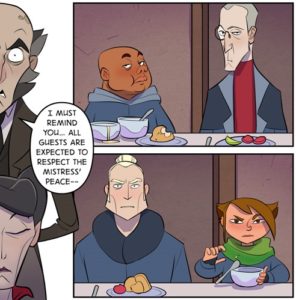On when to keep quiet.
Delivery is important, performance can be powerful. A key part of both is shutting up.
Beats
A beat is a short pause, “approximately the length of a breath”, that comes before or after a line.
It’s used “either to indicate ‘thinking time’ or to increase the impact of the subsequent reaction“. In other words, it emphasizes. You can have a short pause between your own words or sentences, as you talk, or you can use it after someone else talks, before replying.
Beats (and occasionally sighs or “emm”s) can also be used to signal other things, such as:
I’m fighting my impulses: “I’m telling you, if I get a moment with him alone, I’ll… *beat, biting tongue* Go talk to him, now.”
I’m easily confused: “We went straight through to the central– erm… No wait, first we stopped at the inn…”
I’m currently preoccupied: “For you? Twenty gold! Yes, it’s the best… *stares behind you* Hmm. That girl there looked like she was going to steal something. Where was I? Yes, best deal for you!”
All of these might arise from the player’s natural speech patterns – perhaps he is fighting his impulses, or was actually confused – but they can also be used deliberately to say something about the character who’s doing the talking.
Long pauses
These are pauses that are so long, that they become noticeable. A beat is a part of a conversation; a long pause is its own thing. These pauses are best used during descriptions, unlike beats, which are best when used during an in-game conversation.
A long pause builds tension, which means it can be used in two main ways: For suspense, or for comedy (which is basically tension released in a way that’s perceived as non-harmful).
GM: You enter the yard, expecting to see dozens of well-armed dwarves. And you do. All dead. *taking a long pause, lifting hands to signify she isn’t finished talking* From the top of the keep, a black flag hangs down, in tatters… *beat* The Smiling Skull.
It can also be used for both.
Player: I’ll try to sneak past the wizard into his study.
Player: *Rolls poorly on the stealth check, thinking the wizard will now surely polymorph him into an avocado* Oiiii…. *Stares at the die, stares at the GM*
GM: *Knowing the wizard has very little to do with the adventure at all, decides to use this for comedy; stares at the player for a good 3-4 seconds, then talks as the wizard* Just so you know, people usually hide behind the curtains when they try to sneak past the window.
Not talking
Because the GM is the interface through which the players interact with the game world, and because 75% of the GM’s interactions with the players are speech-based, not talking can have several effects on the game. I usually use it in the following ways:
Create suspense: When the players are anticipating something that’s supposed to happen, you can give only a bare-bones description, and then just shut up (without even the “what do you do?” which is a commonly used call to action at the end of a GM description), forcing the players to ask for specifics, making it feel as if the PCs are frantically looking around, hyper-aware, noticing things one by one because they’re so focused on each thing. Force them to ask you for details. By simply not talking, you make them feel like they are responsible for handling the time-sensitive problem that is going, and they must act – as players, by asking for details and saying what the PCs are doing – in order to prevent whatever outcome is coming.
It might be that the players start acting without first asking for more details. Just mention that detail that interferes with their action; again, it makes it feel as if the PCs are so anxious, they haven’t thought their actions through.
GM: You enter the town square, lots of people have gathered to see the Queen’s speech.
Players: *Knowing there’s going to be an assassination attempt on the Queen’s life, who they hold dear, waiting impatiently to hear more*
GM: *Shutting up*
Players: *Realising they’re not going to get anything else “for free”, and getting anxious*
Player A: Okay! I’m going through the crowds to get as close as I can.
GM: The guards around the square stop you–
Player B: There are guards around the square?!
Player A: Maybe one of them is the assassin?!
Player C: WHAT ELSE DON’T WE KNOW!
Players: *Panic, start asking for lots of details*
Have them tell you what’s going on: When players start discussing the current scene, plot, or NPC among themselves, you can shut up and let them give you tons of interesting suggestions about the topic at hand. Being genre-savvy has nothing to do with it – new players are just as likley to say “Ah, that must be where she keeps the book!”. Players just enjoy speculating, so don’t interfere.
Player B: There are guards around the square?!
Player A: Maybe one of them is the assassin?!




